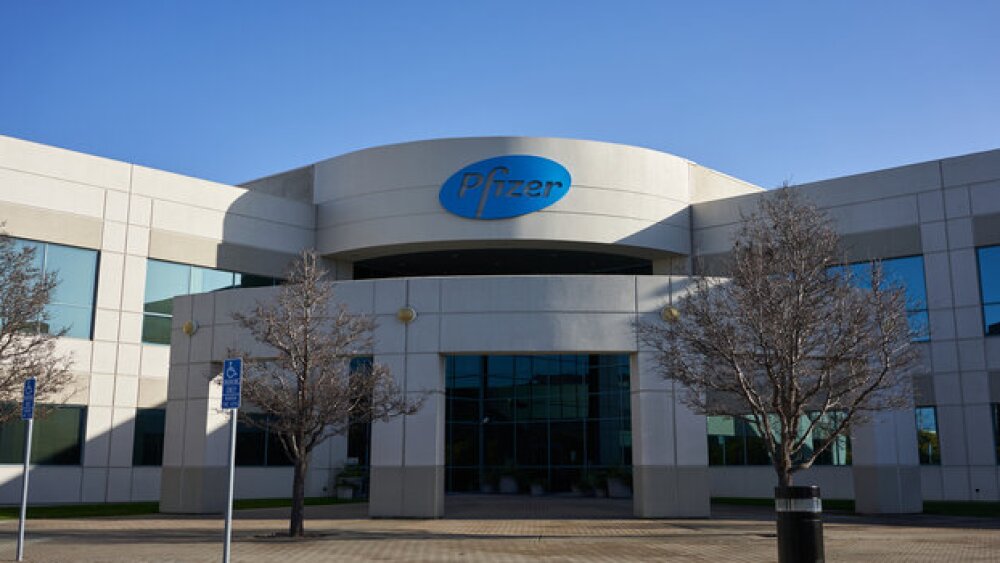Excluding its COVID-19-products Comirnaty and Paxlovid, Pfizer’s revenue in the fourth quarter of 2023 grew 8%. The company projects full-year revenue in 2024 to remain about flat.
Pictured: Pfizer building in San Francisco, California/iStock, hapabapa
Post-pandemic Pfizer is still recuperating from the drop in demand for its COVID-19 products. The pharma giant Tuesday reported a 42% drop in fourth-quarter 2023 revenue thanks to its Comirnaty and Paxlovid products, compared to the same period in 2022.
Yet, things are not as bad as they could be. Thanks to a lower loss of revenue than expected from its COVID-19 business, Pfizer managed to surprise Wall Street with fourth-quarter adjusted diluted earnings of 10 cents a share—compared to the consensus estimate of a loss of 18 cents—while revenue for the quarter came in at $14.25 billion, down slightly from the $14.42 billion analysts expected.
Around $3.5 billion of Pfizer’s revenue was reversed in the quarter due to the anticipated return of Paxlovid, its COVID-19 antiviral drug, from the U.S. government. However, the 6.5 million doses returned were less than expected, saving the company around $700 million in additional loss.
Pfizer’s COVID-19 vaccine Comirnaty brought in $5.36 billion in revenue for fourth quarter—a 53% drop from the same quarter in 2022.
Excluding Comirnaty and Paxlovid, company revenue grew 8% in the the fourth-quarter. Its new RSV vaccine posted $515 million sales for the quarter, while strong sales of Vyndaqel—which delays nerve damage caused by a hereditary heart disease—brought in $961 million. Eliquis, its blood thinner with partner BMS, beat analyst expectations with $1.61 billion in quarterly revenue.
Pfizer has been working to improve its bottom line, announcing a sweeping $3.5 billion cost-cutting initiative in October 2023 and adding another $500 million cost reduction to its plan last month. Still, over the last year, Pfizer’s stock has dropped around 36%.
The company is trying to tap into the exploding obesity market with its oral GLP-1 drug danuglipron. In December 2023, the company dropped its twice-daily version due to high rates of side effects. Results for its once-daily version are anticipated in the first half of 2024. It was the second setback for Pfizer in the obesity market after it halted development of another GLP-1 drug in June 2023 due to heightened concentrations of liver transaminases found in patients.
Pfizer’s full-year 2023 results landed at $58.5 billion, setting expectations for 2024 to remain flat—or up $3 billion from last year at the high end of the range. The company expects adjusted earnings of between $2.05 and $2.25 in 2024, and revenue between $58.5 billion and $61.5 billion.
Pfizer is anticipating $8 billion in sales of its COVID-19 products in 2024 and around $3.1 billion in revenues from its massive Seagen acquisition, which finally closed in December 2023. Following the close, the company announced a $1 billion deal with Nona Biosciences for a mesothelin-targeting antibody-drug conjugate for solid tumors.
Kate Goodwin is a freelance life science writer based in Des Moines, Iowa. She can be reached at kate.goodwin@biospace.com and on LinkedIn.






